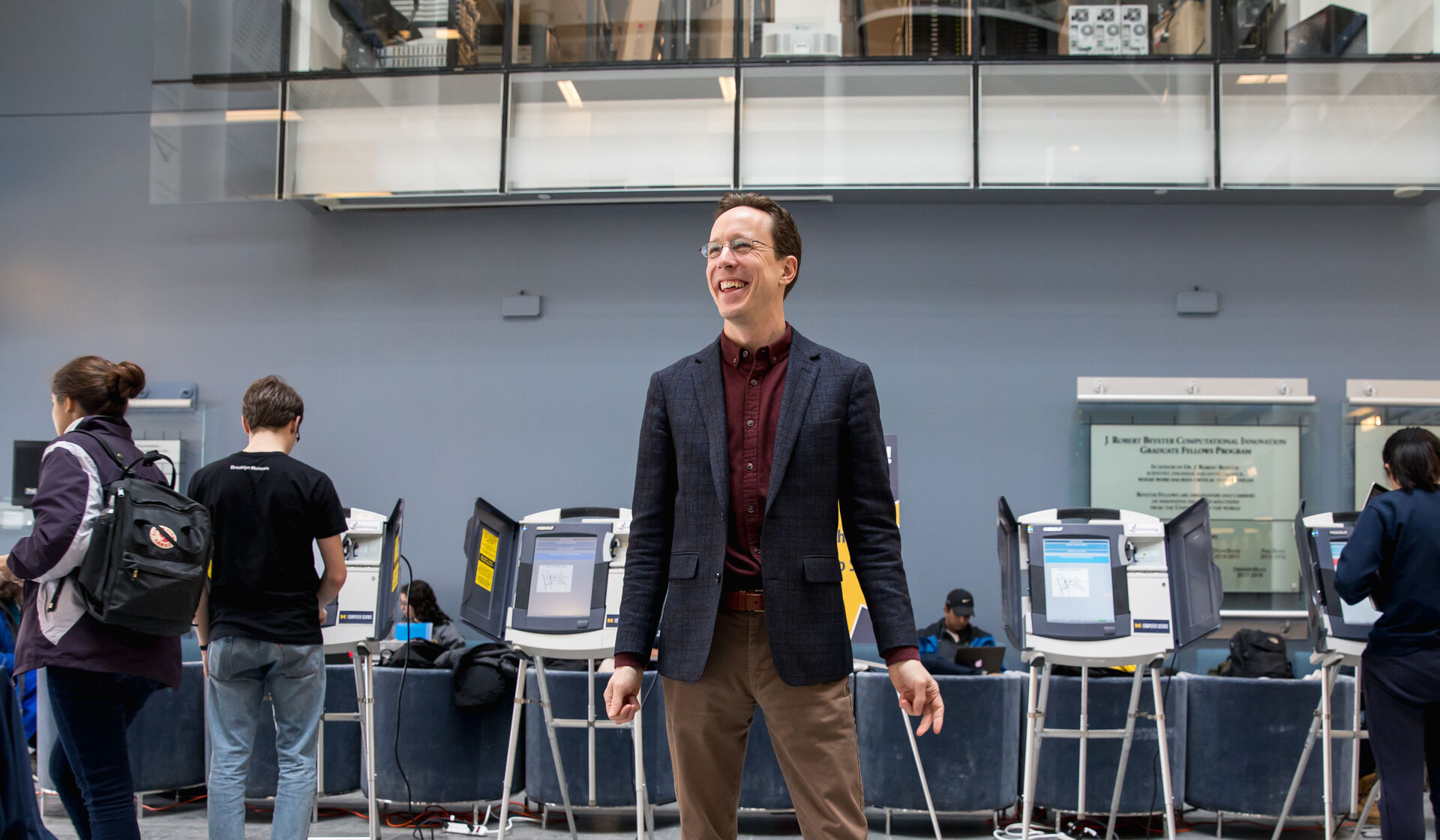It all began with a signed photo of Nelson Mandela that David Turnley, ’77, a Pulitzer Prize-winning photojournalist, sent to U-M’s new head football coach, Jim Harbaugh, ’86, in early 2015.
“I did not know him personally, but I had tremendous respect for him as an athlete, coach, and intellectual,” recalls Turnley, whose own career has taken him to Iraq, China, Afghanistan, and Cuba. “I also knew we had a lot in common.”
Indeed, they did. Like Harbaugh, Turnley returned to U-M, but in 2012, when he became an associate professor of documentary photography in the Stamps School of Art & Design. He also briefly played on U-M’s football team. And, remarkably, both men work in the same profession as their brothers. Turnley’s identical twin, Peter, ’77, is a photojournalist of international distinction, while Harbaugh’s brother, John, is the Baltimore Ravens’ head coach.
Now Turnley and Harbaugh are the co-authors of a hefty, black-and-white pictorial book titled “Enthusiasm Unknown to Mankind.”
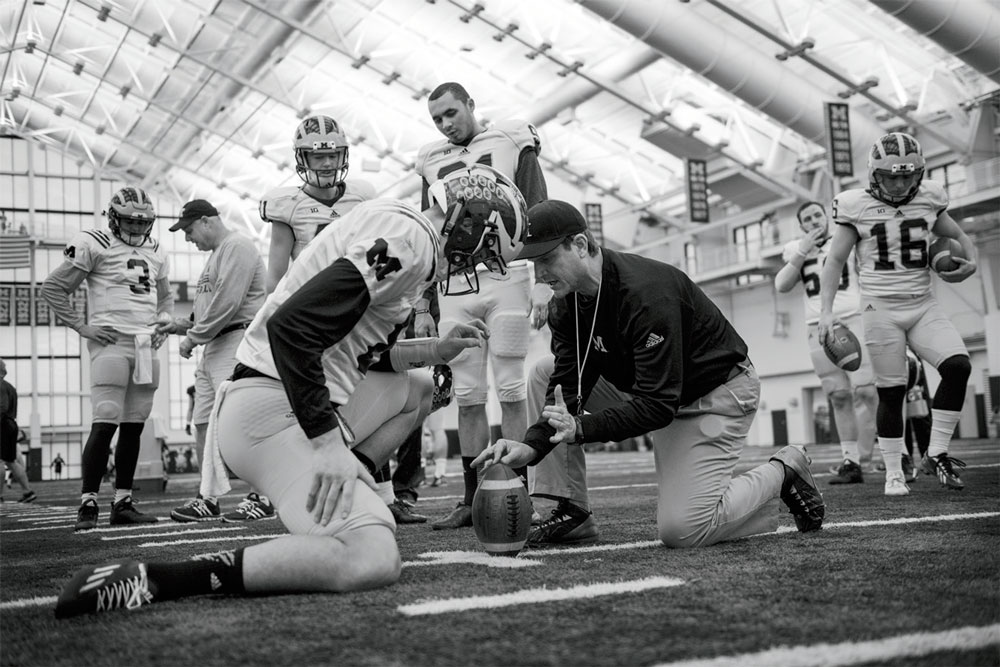
Since meeting, the two have barely spent a day apart. “I wanted to document Harbaugh’s era of making championship men,” Turnley says of the 16 months and counting he has photographed the team both on and off the field.
“David is a very good twister of arms,” says Harbaugh. “I think it must come from years of having to talk his way through war zones.” Michigan Alumnus caught up with the two men in early August. For 40 minutes, they reflected on how their collaboration—which resulted in 70,000 images by Turnley and a 9,000-word essay by Harbaugh— ultimately led to a deep friendship and a shared mission.
Michigan Alumnus: Coach, what made you agree to this ambitious project?
JIM HARBAUGH: My first reaction was skeptical. You always worry about that behind-the-scenes, peel-back-the-onion type of project. I always think a team should be able to just work amongst themselves, make mistakes, learn from them. But then I thought, “It would be great if every guy on the team could have a picture to put on his wall, give his parents, or put on his desk one day.” A lot of times, it is just the stars who have their picture in the newspaper, for the catch or the play of the day.
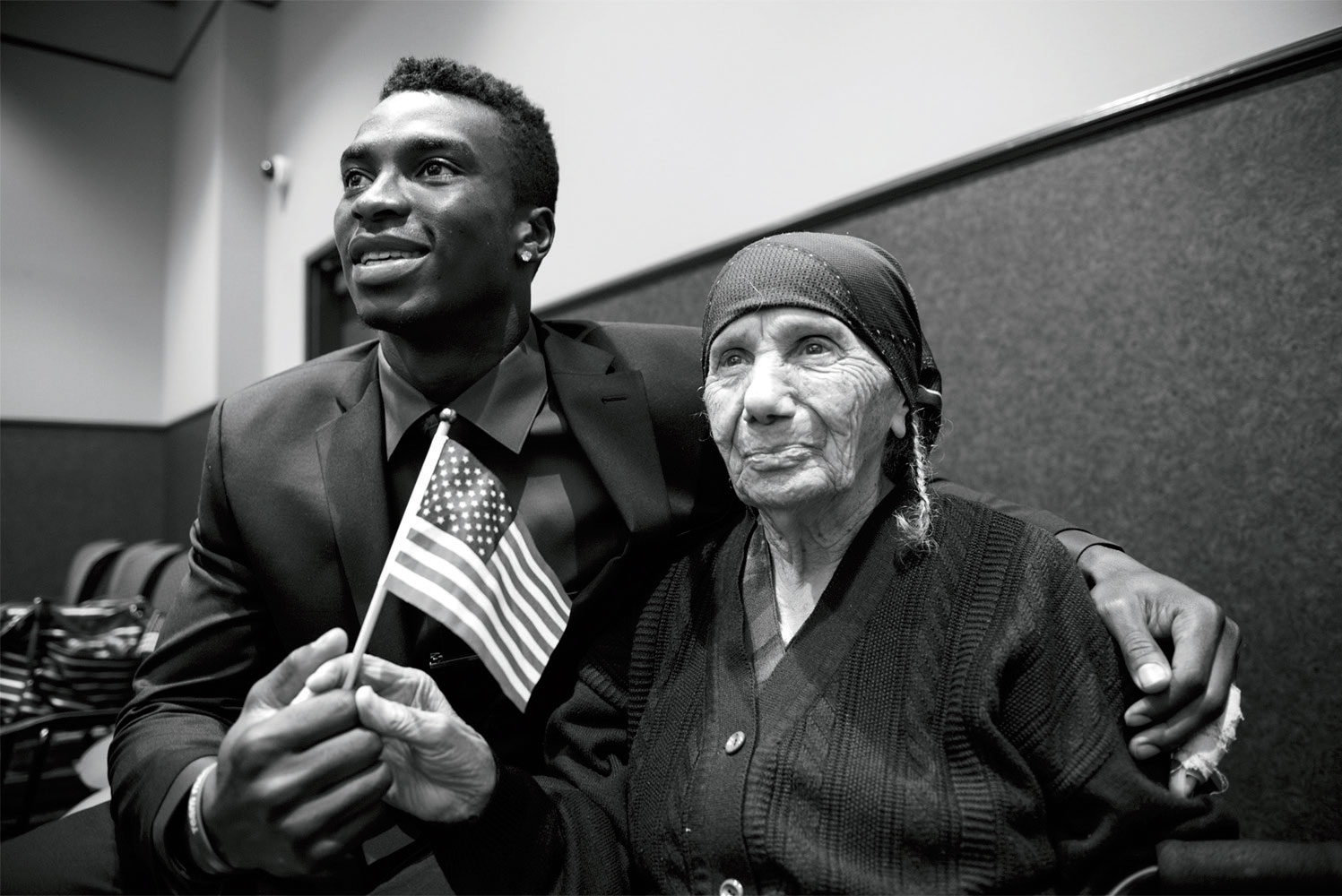
David, what made you want to follow a football team so intensely after covering everything from inner-city street life to 9/11?
DAVID TURNLEY: I grew up in Fort Wayne, Indiana, with big aspirations for playing football, and when I got to Michigan I was a walk-on for just two weeks before they told me I would not see a minute of playing time. I did not have the God-given gifts that Jim has. But as a war photographer, I have respect for the game, for the toughness of it, and I had a reverence for Coach Harbaugh.
JH: What really sold me was David’s track record—his being a war photographer. This guy has had bullets flying around him. He had the drive and determination. We all felt that he is for us, not against us. You don’t put people in front of your team unless you know that.
DT: Coach introduced me to the team by showing them the “60 Minutes” piece. (In 1996, CBS produced a segment on the Turnley brothers titled “Double Exposure.”) He said, “I am going to get you a standing ovation.” When it was over, coach jumped up at the end and everyone else did, too.
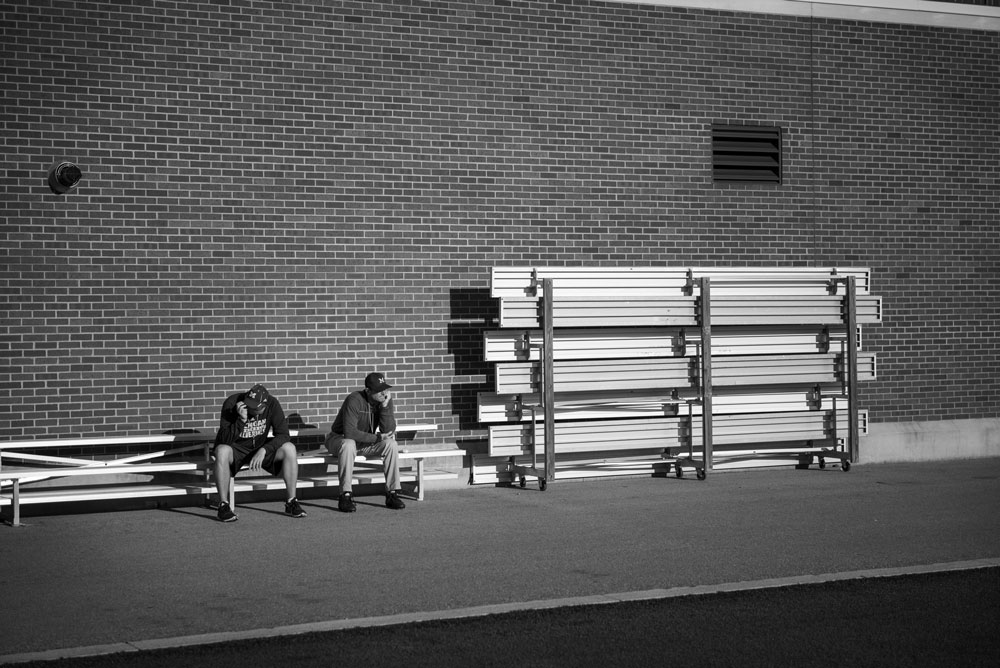
How did you get such close-up images with a hand-held Leica camera?
JH: When the images first started coming in, I was like, “Where did you get this shot? How did you get this shot?” And then I realized you were actually in the huddle at practices.
DT: My thought is, whether I am in a war zone or on a football field, I don’t want to be on the sidelines and get a free pass. I want to be in there.
Coach, what was your reaction to the first photos he showed you?
JH: I saw the real advantage of David. It was powerful and motivating for the players to see themselves up there playing football. This is what football is really like. It is hard, it’s rough, it’s tough, and it is not a lot of fun. You have to have a love for the struggle because you don’t play a lot of games. Within the first week of spring practice, I asked David to make a slideshow and we put it to music. I now show it to recruits, parents, passersby. I can’t watch that slideshow enough.
How did you eventually choose the 306 photos in the book?
JH: I meticulously went through them with David. And I counted how many times a person was in a picture to be sure we got everyone. Everyone was in multiple times.
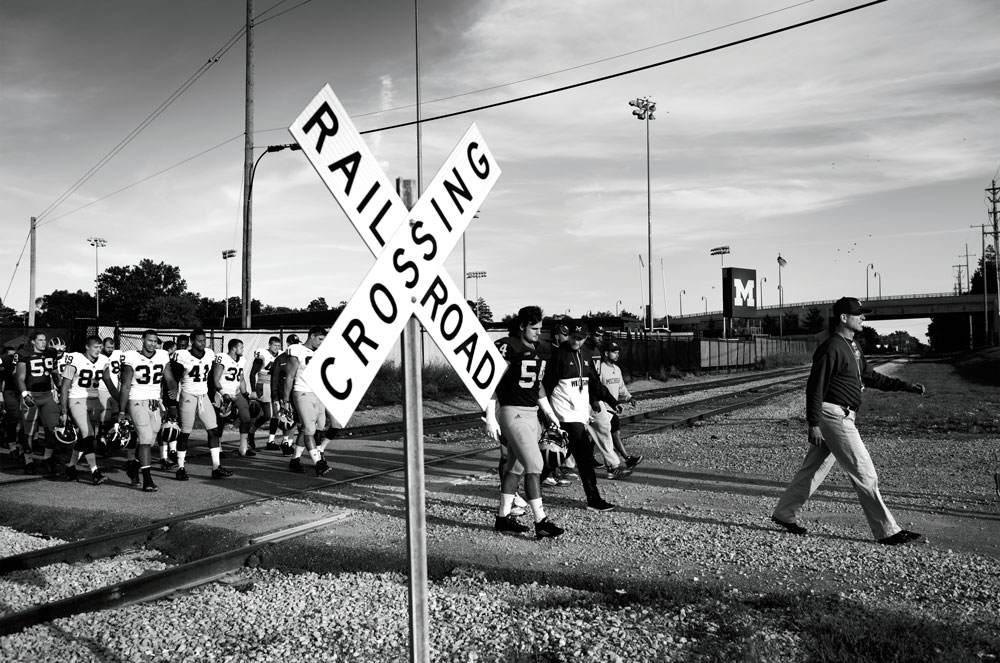
You wrote 16 pages in the book describing the “15 principles” behind your football program: “Being Coachable,” “Meritocracy in Football,” and “The Love of the Game” were just a few. But you also defined the importance of words like “success” and “discipline.” How was it putting your thoughts down on paper?
JH: David asked me to write a “treatise.” I had to look the word up, but now I have written a treatise. It was really hard. I was not very good at math, but I was always a pretty good writer. I passed out of freshman English at Michigan. But now, I have a new respect for writers.
So did anyone edit you?
JH: No. Some people tried and would say, “Another word might flow better here.” But I said, “No, this is how I talk.”
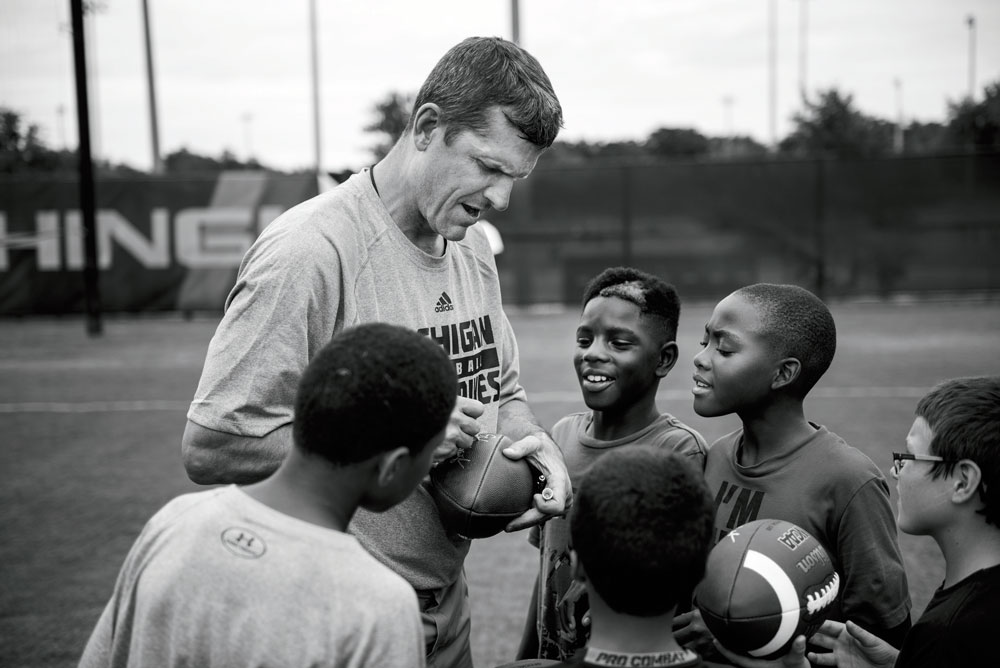
You quoted Winston Churchill, Franklin Delano Roosevelt, Thomas Jefferson, and Martin Luther King Jr. You obviously read a lot. Oh, and you quoted Judge Judy, of course.
JH: I love books. I read slowly, but I love books.
David, how much time did you actually spend with the team considering you are also teaching?
DT: Honestly, it was hard for me to get enough of being with the team. It is contagious. I teach in the morning, drop my backpack off at 1 p.m., grab my camera bag, and then head to practice with the team. I also travel with them to games. But I love teaching. I fell into photography at 17 with my twin brother. It never occurred to me that I wanted to be a photographer. But then I started to see the ability for photography to give me a voice, and I never looked back.
Tell us about the title of the book.
DT: Jim’s dad, Jack, used to say to him, “Attack this day with an enthusiasm unknown to mankind.” And that is the way he lives every day, showing everyone an enthusiasm unknown to mankind. My goal was to photograph that enthusiasm and the excellence that Coach Harbaugh epitomizes in every imaginable way, each day.
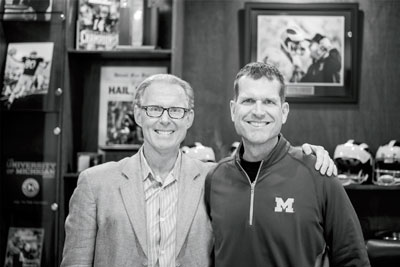
“This will be an everlasting friendship. Dave offers a good positive word to just about everyone he comes in contact with.” —Jim Harbaugh
Jennifer Conlin, ‘83



